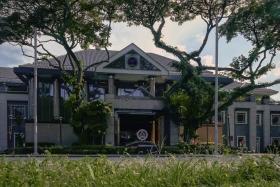Singapore works hard to maintain religious harmony: PM Lee
PM Lee describes how Singapore maintains interfaith peace as he accepts World Statesman Award
Singapore is ranked the most religiously diverse country in the world, but its harmonious society did not come about by chance, said Prime Minister Lee Hsien Loong in New York on Monday.
Rather, it worked hard to lay the foundation for religious harmony and maintain it over the years, he said in a speech on Singapore and the Government's approach to race and religion.
"We did not become so because Singaporeans are a uniquely virtuous people," he added, when accepting the World Statesman Award from the Appeal of Conscience Foundation, a New York-based interfaith group promoting mutual acceptance and respect.
"We created structures - constitutional, political, social - that discouraged intolerance, curbed chauvinism and nudged social behaviour in positive ways."
As examples, he cited the country's "strictly secular, but not anti-religious" constitutional approach that treats all faiths impartially, as well as electoral rules to boost multi-racial politics and policies to encourage people of different races to live and study together.
"I went to a Catholic school - there is a church in the school grounds and across the road, there's a synagogue," said PM Lee, referring to Catholic High School when it was in Queen Street and Maghain Aboth Synagogue at Waterloo Street.
He also noted the compromises religious groups make, like mosques toning down their loudspeakers that carry the prayer call, and how, to make up for it, the call is broadcast on national radio.
On their part, Christians exercise restraint proselytising to people of other faiths, he added.
PM Lee said he accepted the award on behalf of all who contributed towards building a harmonious society in Singapore.
Past world leaders who received the award included German Chancellor Angela Merkel and former Indonesian president Susilo Bambang Yudhoyono.
Reading the citation was former US secretary of state Henry Kissinger, 96, whom PM Lee called a long-time friend of Singapore who was also a close friend of his father, founding prime minister Lee Kuan Yew.
Singapore's harmonious society, however, is facing a world that is changing, and Singaporeans need to adapt to new forces, said PM Lee.
He listed four: growing religiosity among all faiths, external influences, provocative views that proliferate on social media, and violence in the name of race and religion.
First, people among all faiths are practising their faiths more fervently, which in itself is not a bad thing, he said.
"But as convinced as one might be of one's own faith, we cannot... show disrespect to other people's faiths or other people's gods."
This is why Singapore opposes practices that discourage people from befriending those of other faiths or exchanging greetings during their religious festivals.
Second, racial and religious groups in Singapore have extensive links with their larger counterparts abroad, which can inadvertently result in the import of disputes from other lands. This can undermine social cohesion.
Singapore therefore bans or expels foreign preachers who bring their foreign quarrels into the country, or who want to persuade Singaporeans to practise their religions in ways inappropriate for local society, said PM Lee.
Third, social media means a single offensive or thoughtless post can go viral and be seen by millions. But policing the Internet was a Sisyphean task that still needed to be done, he said, referencing the new Protection from Online Falsehoods and Manipulation Act.
Fourth is the continuing threat of terrorists who pervert and misuse religion to justify violence.
But government actions alone cannot bring about religious harmony, he said, calling on "responsible voices" to spread the message of tolerance and respect.
Get The New Paper on your phone with the free TNP app. Download from the Apple App Store or Google Play Store now



